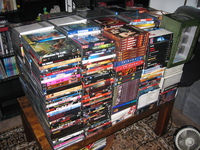The Real Value of Software
A minimalist’s view
I am undeniably a software fanboy. I work in the industry, I have aspirations to entrepreneurship, and software is my favorite hobby. I like helping people learn how to create and manipulate software. Creating something, something powerful and lasting, where nothing was before and using nothing but your own wits is and will remain one of the most rewarding and challenging aspects of my life. Recently though, I’ve come to realize that there is a deeper promise of software, one that offers a compound benefit to all of us. Software serves to staunch slightly the wound that threatens all of our well-being and the well-being of the planet on which we live: rampant consumerism.
[Sidebar: I say staunch and not repair because software doesn’t really solve anything at a fundamental level. To escape from the ‘more is better’ cycle, we need to shift our perceptions about what makes us happy and what is really valuable, and this will require participation from all levels. Ourselves as individuals, our friends and family, our media and our ostensibly “society”, up to the level of policymakers and economists, everyone will need to rethink priorities for a cure instead of a stopgap.]
What do I mean? Here are a couple of examples:
 becomes
becomes

 becomes
becomes

 becomes
becomes

…and numerous other examples. Somehow, under the guise of lower prices, software and the Internet have convinced millions of people to get rid of vast swaths of their things, reducing manufacturing output, waste, and footprint in one fell swoop!
Space
“So I threw out all my old Backstreet Boys CDs when I got my iPod, so what?” It’s true, it may seem like a somewhat trivial example. However, aside from the ongoing benefit (you haven’t bought many CDs since then either, have you?) this reduction, and any reduction in the literal footprint of the things we purchase may translate into a reduction in the space we feel we need to live. Smaller apartments and smaller houses in turn translate into a reduced environmental impact, as energy requirements and sprawl are reduced.
Furthermore, though the death of the local shop at the hands of the Internet is generally considered to be a bad thing, one happy side effect is that fewer shops are being built. Less development means less sprawl, less construction waste, and less energy to keep those buildings lit and heated. Though it’s hard to say for sure, odds are favorable for a net-positive reduction in energy overall moving from brick-and-mortar shops to online venues.
Waste and pollution
Like the movement away from brick-and-mortar shops, the slow death of the mail has been lamented by many. Ignoring the socioeconomic benefits of mail delivered everywhere, it is hard to argue that the amount of waste paper generated versus email was a good thing. Similarly, the environmental costs of moving mail from place to place won’t be missed.
More generally, software has allowed us to eliminate many forms of waste and pollution, both obvious and subtle. A giant pile of discarded junk mail is one thing, but we’re also getting rid of the over-packaged media goods we purchase. Though we’re really just touching the tip of the iceburg thus far, telecommuting is cutting down on emissions from our vehicles getting us from home to work and back everyday. Built-to-be-consumed items like calendars are not only cheaper but better when they are digital.
Attitude
As mentioned above, a reduction in space and waste isn’t solving the problem of consumerism. To really address the issue, we need a change in attitudes. Though I don’t have any proof for this, I personally think that eliminating our common “collections” - DVDs, CDs, books, and the like - we are retraining ourselves to stop collecting. The mentality that a bigger collection (of anything) is better, that more is better, is the root of the problem of consumerism, and a source of much pain and frustration, not to mention waste and pollution.
I also think this elimination of visibility will continue. Smart phones and their capability for software have let us consolidate our telephone, Gameboy, iPod, GPS, camera, and alarm clock, and are working on our Kindle and television. The removal of brick-and-mortar stores will cut down on window shopping and impulse purchases. [How we will fare versus truly targeted advertising and marketing that follows us everywhere is another story, and perhaps a worse one in the end.]
Perhaps our collections just shift. Instead of DVDs, we collect apps; instead of electronics we collect followers. If that’s the case, then we’ll just be trading one kind of consumerism for another. Ultimately it’s better for the environment either way. I hope, though, that software will deliver on its promise of a simpler life less encumbered by the burden of a desire for more at any cost.